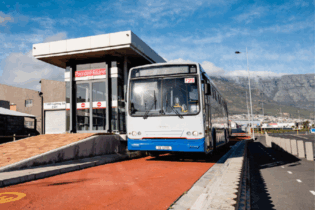“Fleet managers grapple with a wide range of issues that lead to sleepless nights. Not only are their diverse operations exposed to outside risk, but they often have to juggle the needs of machines as well as humans in a dynamic, changing environment,” says Dr David Molapo, Head of Fleet Management at Standard Bank.
“We spoke to fleet managers about their most recent pain points – and what they’re doing about them, and this is what they had to say.” Rising costsWhile some fleet managers say their companies or industries have ways of absorbing the seemingly relentless rise in fuel costs, those who have strict cost-savings targets to meet find that it is their biggest headache. Daylene Damons, fleet manager at the multi-national JTI, says incremental fuel-saving through measures such as monitoring driving behaviour are no longer enough for the targets she is chasing. After careful test runs, her company has decided to move its fleet from petrol to diesel vehicles. They have proved to be much lighter on fuel, and the total cost of diesel vehicles over their lifespan is cheaper. Shaun de la Peyre, national fleet manager at Lancet Laboratories, agrees that vehicle selection is key to keeping fuel consumption down. The trick is not to be blinded by the purchase price, but to look at the overall costs, including fuel consumption. This has helped him keep his 600-vehicle fleet’s average consumption at about 7.1 litres per 100km. Apart from getting the cost-per-kilometre down, Damons finds she has to look closely at cutting the number of kilometres by curbing the private or unnecessary use of fleet vehicles. She is currently updating her company’s fleet policy – that’s the easy part, she says. Turning the policy into practice is going to be the hard part. E-tolls
A year and a half ago e-tolls did not exist as a problem for fleet managers. However, many fleet managers have become accustomed to the costs. But they do struggle with faulty bills. Damons says the monthly cap of R450 per vehicle is sometimes exceeded, and Sanral’s “pay now, argue later” principle in effect becomes a “pay now, write it off” scenario for the fleet manager. He says e-tags, the electronic device which automatically logs the vehicle’s passage through the toll-road gantries, sometimes don’t work. The vehicle is still billed by the tolling system, but it loses the discount extended to e-tag users, he says points out. De la Peyre says Lancet receives at least five bills per month in which the registration had been misread by the gantries. He finds these “almost impossible to resolve,” despite the fact that a colleague spends at least one day a week at Sanral’s offices. Mary-Ann Calvert, fleet manager at Masslift Africa, experiences the same billing problems, and has also found that sometimes vehicles disposed of – through sale on the second-hand market are not recorded/updated on the e-tolls billing system, and Masslift continues to be billed for the vehicles. Accidents
A startling number of fleet managers mention an increase in their accident rates as a rising challenge and mention deteriorating road conditions and increasing potholes as one of the underlying causes.
“Pothole damage is becoming more prevalent. That is a challenge for us here in Gauteng. Sometimes it can be minor potholes, but the vehicles come back, you inspect them and you realise that they’re damaged,” says Anesh Kassen, BMW group fleet operations manager.
Calver has had a similar experience. A year or two ago, their insurance service provider reviewed their premiums downward because of their low claims ratio. But in recent months she has had to process as many as seven claims. A number of them were caused by potholes, she says. She believes a recent increase in windscreen damage is also related to deteriorating roads. De la Peyre says potholes are “without a doubt” an increasing problem, especially in outlying areas. Strictly no mag wheels on any of his fleet’s vehicles, he says. Stock standard wheels help to minimise the repair bills. Licensing, registration and speeding finesKassen, who runs a fleet of between 1 000 and 1 200 vehicles, says delays in the licencing and registration of vehicles have recently emerged as a challenge. In the past, the turnaround time was a day or two, but nowadays it can take several days. Because licencing and registration is a municipal function, the service levels vary from centre to centre, depending on where the vehicle has to be registered. The post office strike has played havoc with the usual flow of speeding fines, says De la Peyre. Even today, months after the strike, the service is erratic, making the rerouting of fines to the drivers difficult. Driver behaviour
Bad driver behaviour is a pain point as old as fleet management itself, but could it be that the situation on South African roads has been particularly tense of late? This is a question that Calvert has been asking herself after some of her drivers had recently been involved in a couple of incidents. Other fleet managers report that driver behaviour is just as bad, or as good, as always, but what has made a big difference to their work is the ability that telematics have given them to monitor driver behaviour. Speeding, harsh braking and excessive idling can now all be flagged through a system of exception reporting, and can be taken up immediately with the offending driver. It is perhaps an indication of the success of telematics that Damons mentions recent trouble she has had with a telematics service provider that took up to three weeks to fix faulty units. Because her fleet management system can no longer do without telematics, she has decided to move over to another service provider. De la Peyre acknowledges the role of telematics in the management of driver behaviour. Lancet was one of the pioneers of full telematics in South Africa. The challenge for fleet managers, however, is how to deal with the huge amount of data generated by such a system. He receives a helpful daily report from his telematics service provider, but he admits that it may be flagging only the most flagrant exceptions, and that many more abuses may be lying buried in the data. Card Fraud
Fuel card fraud is not at epidemic levels, say fleet managers, but it still requires vigilance. De la Peyre has experienced garages deliberately ringing up inflated totals. Standard Bank’s transaction authorisation system has helped, he says. It automatically declines any transaction that falls outside certain parameters, such as filling up more than the tank capacity, or filling up twice within a certain time frame.








